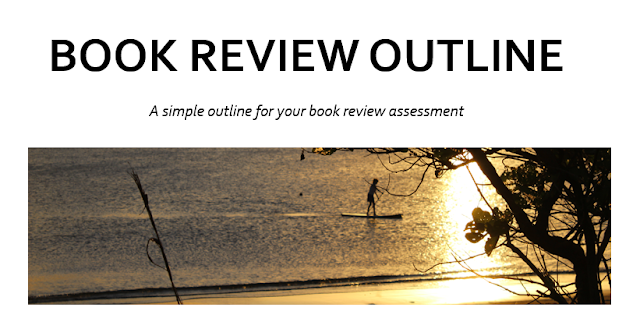A book review outline I find very useful, especially when reviewing an academic thesis as an assessment task. If you are looking for a simple outline for your uni assessment, you'll find this outline useful too.
Establish a Background, identify the book by author, title, and publishing information.
Include some background to enable readers to place the book into context. Describe the general problem the book addresses or earlier work the author or others have done. In framing your review, you should provide some information on the author. What are her relevant qualifications and background (or lack thereof) for writing on this subject? What were his reasons for writing this book? (Often the preface contains such information.)
1. Content Summary
1.1. Overview A book review is an essay whose purpose is to comment on a particular work bearing upon a single subject or related subjects. Provide an overview, including paraphrases and quotations, of the book's thesis and primary supporting points. The most important element about a book review to remember is that it is a commentary, not just a summary. Present an overview of the book, an outline or synopsis of the major topics, indicating the scope, the major emphasis (political, economic, intellectual, etc.) and which, if any, aspects of the subject are totally ignored.
1.2. Comparative Evaluation – a Recent Publication
What evidence is cited? Has new documentation become available? If so, identify the new documentation. Or, does the book present a novel interpretation based on previously available documents or information? Your conclusions and assessments regarding these aspects will affect your comparative evaluations of the works. You should also consider the time during which the book was written and, if evident, the author's values and biases. For example, a book on sociocultural evolution written by a conservative Republican sociologist in the 1950s (say Talcott Parsons) would be quite different than one written by a member of the American Socialist party (say Harry Braverman).co
Recommended A review of Helen Tovola's Secondary Education in Fiji - Key to Future
Note:
*It will probably will be necessary to refer to specific portions of the books to illustrate your statements and conclusions, but it is generally not advisable to quote extensively from it. Do not try to make more points than can be accomplished thoroughly in your review. It is better to make a few points well than many points poorly. Once you have decided on the central points you intend to make, treat each one as a separate section of your review. Each section should explain the one point, supporting it with your own arguments and with brief examples from the book under review and drawing conclusions as to the meaning and importance of the point.
* The purpose of the review is to critically evaluate the text, not just inform the readers about it. Leave plenty room for your evaluation by ensuring that your summary is brief. Determine what kind of balance to strike between your summary information and your evaluation. If you are writing your review for a class, ask your instructor. Often the ratio is half and half.
2. Your Evaluation – Opinion & Discussion: Choose one or a few points to discuss about the book. What worked well for you? How does this work compare with others by the same author or other books in the same genre? What major themes, motifs, or terms does the book introduce, and how effective are they? Did the book appeal to you on an emotional or logical way?
The bulk of your review should concentrate on your evaluation of the way the author handled the issues discussed.
2.1. Describe the book: What is the overall thesis? Is it interesting, memorable, entertaining, instructive? Why?
2.2. Respond to the author's worldview: What do you agree with? And why? What do you disagree with? And why?
2.3. Explore issues the book raises: What possibilities does the book suggest? Explain. What matters does the book leave out? Explain.
2.4. Relate your argument to other books or authors: Support your argument for or against the author's opinions by bringing in other authors you agree with.
2.5. Relate the book to larger issues: How did the book affect your worldview of sociocultural stability and change? How have your opinions about the topic changed? How is the book related to the course? How did the thesis compare with other course material? What are your reactions? Did the book enhance your understanding of the issues? Be as direct as possible.
3. Conclusion - summarise the discussion
Source - http://faculty.rsu.edu/users/f/felwell/www/Info/BookReview2.htm



No comments:
Post a Comment